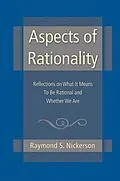What does it mean to be rational to reason well and effectively? How does rationality, broadly conceived, relate to the knowledge one acquires, the beliefs one forms, the explanations one constructs or appropriates, the judgments and decisions one makes, the values one adopts? What is the character of human reasoning and, in particular, does it t
Autorentext
Raymond S. Nickerson , retired senior vice president of Bolt Beranek and Newman Inc. and research professor at Tufts University, is a fellow of the American Association for the Advancement of Science, the American Psychological Association, the Association for Psychological Science, the Human Factors and Ergonomics Society, and the Society of Experimental Psychologists. He is the founding editor of The Journal of Experimental Psychology: Applied, the founding and series editor of Reviews of Human Factors and Ergonomics, an annual publication of the Human Factors and Ergonomics Society, and the author of several books, including Mathematical Reasoning: Patterns, Problems, Conjectures, and Proofs (Psychology Press, 2010).
Zusammenfassung
What does it mean to be rational , to reason well and effectively? How does rationality, broadly conceived, relate to the knowledge one acquires, the beliefs one forms, the explanations one constructs or appropriates, the judgments and decisions one makes, the values one adopts? What is the character of human reasoning and, in particular, does it t
Inhalt
1. What is Rationality? 2. The Search for Standards of Rationality. 3. Intelligence and Knowledge. 4. Beliefs. 5. Goals, Value, and Affect. 6. Explanations. 7. Preferences and Judgment. 8. Decision and Choice. 9. Understanding and Wisdom. 10. The Relativity of Rationality. 11. Conclusions and a View.
